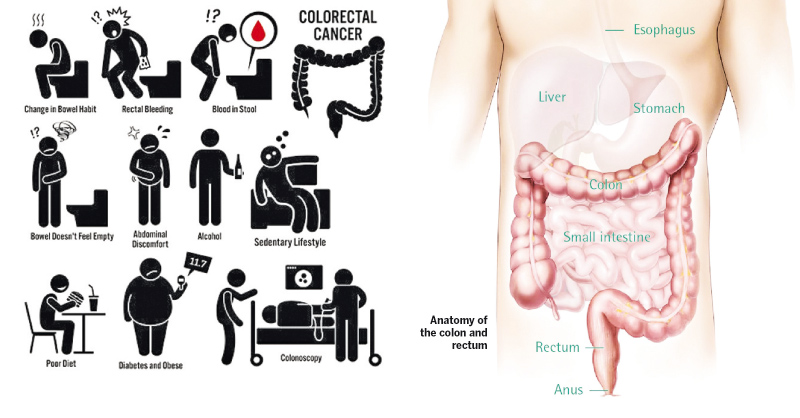A change in colon cancer screening recommendations, from age 50 to 45
On May 30, the American Cancer Society (ACS) announced an update in guidelines for screening for colorectal cancer, moving up its recommendation from the first screen at age 50 to age 45. The goal is to find colorectal cancer early, before symptoms start, and when it is small and easier to treat. 
This doesn’t mean that they are recommending that all adults at age 45 start yearly colonoscopies. They say that research has concluded that an earlier start to screening “would save lives” and subsequent screening recommendations will be determined by results of your initial screen, your family history, and your current health.
As detailed by the U.S. National Institutes of Health’s National Cancer Institute, colorectal cancer is a disease in which abnormal cells in the colon or rectum divide uncontrollably, ultimately forming a malignant tumor. (The colon and rectum are parts of the body’s digestive system, which takes up nutrients from food and water and stores solid waste until it passes out of the body.)
The New York Times reports that Dr. Thomas Weber, co-chairman of an early-age onset colon cancer task group for the National Colorectal Cancer Roundtable (but not involved in writing the new recommendations) has endorsed the recommendation, calling it a “game changer” that could save thousands of lives. He said, “Solid epidemiological data from our national cancer registries documents a dramatic increase in the incidence of colon and especially rectal cancer among individuals under the age of 50, and the vast majority of those cases are in the 40- to 49-year-old age bracket.”

The ACS says that colonoscopy is just one of the many available screening tests. Others include CT colonography (also called virtual colonoscopy), which is a scan of the colon and rectum, requiring bowel prep but no sedation. High-sensitivity fecal occult blood tests (FOBT) check for blood in the stool, which can indicate cancerous or non-cancerous conditions.
Watching the CBS News this morning, one of the female anchors quipped, “The prep for a colonoscopy is worse than the test itself.” The reporting doctor quickly replied, “But it’s a whole lot easier than treatment for cancer.” She quickly agreed.
Experts say that colonoscopy is still the most reliable screen for cancer, but any colon cancer screening test is better than none at all.
Read more about screening options and detailed descriptions of prep and pros and cons of each test at Cancer.gov.
According to the ACS, excluding skin cancers, colorectal cancer is the third most common cancer diagnosed in both men and women in the United States. The American Cancer Society’s estimates for the number of colorectal cancer cases in the United States for 2018 are: 97,220 new cases of colon cancer, and 43,030 new cases of rectal cancer. According to the World Cancer Research Fund, 54% of colorectal cancer cases occurred in more developed countries. Natives of Latin America, Asia, and Africa have the lowest rates. The ACS notes factors that may increase your risk include factors you can’t change, including older age, health history (polyps, inflammatory intestinal conditions such as ulcerative colitis or Crohn’s disease), and a family history — and some factors that you can change including smoking, heavy alcohol use, and obesity. The ACS cites research that shows that eating more vegetables, fruits, and whole grains has been linked with a decreased risk of colon or rectal cancer. Eating red meat (beef, pork, or lamb) and processed meats (hot dogs and some luncheon meats) is linked to an increased risk of colorectal cancer.
Susan Burke March, a Cuenca expat, is a Registered and Licensed Dietitian, a Certified Diabetes Educator who specializes in smart solutions for weight loss and diabetes-related weight management. She is the author of Making Weight Control Second Nature: Living Thin Naturally—a fun and informative book intended to liberate serial dieters and make healthy living and weight control both possible and instinctual over the long term. Do you have a food, nutrition or health question? Write to her – SusanTheDietitian@gmail.com
Sources
American Cancer Society. Colorectal Cancer Screening: What Are My Options?
American Cancer Society. Colorectal Cancer Risk Factors.
National Cancer Institute. Tests to detect colorectal cancer and polyps.
NewYorkTimes.com. Cancer group calls for colorectal cancer screening starting at age 45.





















